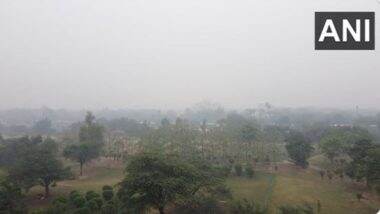New Delhi, November 27: A thick layer of smog veiled the national capital on Monday morning and the air quality was recorded in the 'severe' category in several parts of Delhi. According to the Central Pollution Control Board (CPCB), RK Puram recorded severe air quality with an AQI of 419 at 7:00 a.m.
As per the CPCB, ITO recorded 435, Dwarka Sector 8 at 402, Jahangirpuri at 437 and Ashok Vihar at 455, all in the severe category. Dr RK Sharma, a local resident says, "The pollution level in Delhi is worse, causing damage to the lungs. I experience slight discomfort due to pollution, so people should avoid morning walks and cycling as the pollution level is high..." Delhi Air Pollution: Air Quality Continues To Be in ‘Very Poor’ Category in National Capital (Watch Video).
The air quality index from 0 to 100 is considered 'good', 100 to 200 'moderate', 200 to 300 'poor', 300 to 400 'very poor' and from 400 to 500 or above 'severe'. The AQI is a tool for effectively communicating air quality status to people in terms that are easy to understand. It transforms complex air quality data on various pollutants into a single number (index value), nomenclature and colour.
Thick Smog Can Be Seen in Delhi
#WATCH | The air quality in Delhi continues to be in the 'Severe' category as per CPCB (Central Pollution Control Board).
(Visuals from the Sarai Kale Khan area, shot at 08:15 am today) pic.twitter.com/Iy6ToJeiWa
— ANI (@ANI) November 27, 2023
The recent surge in AQI levels followed the lifting of several restrictions by the Centre last Saturday, which included the allowance of construction activities and the entry of polluting trucks into Delhi.
Restrictions under stages 1 to 3 of the Graded Response Action Plan (GRAP), however, remained in place. Delhi Environment Minister Gopal Rai had conducted a meeting on Friday on increasing pollution in the city. Delhi Air Pollution: No Relief As Air Quality Continues To Be in ‘Very Poor’ Category in National Capital.
"Some increase in the pollution of Delhi has been noted. We had a meeting regarding it. The incidents of stubble burning are very few now, and the level of pollution is still increasing. Scientists reported 2-3 factors for this. The first is that vehicle pollution's contribution is 36 per cent. The second factor is biomass burning. We made some major decisions after seeing this, Gopal Rai said.
(This is an unedited and auto-generated story from Syndicated News feed, LatestLY Staff may not have modified or edited the content body)













 Quickly
Quickly





















